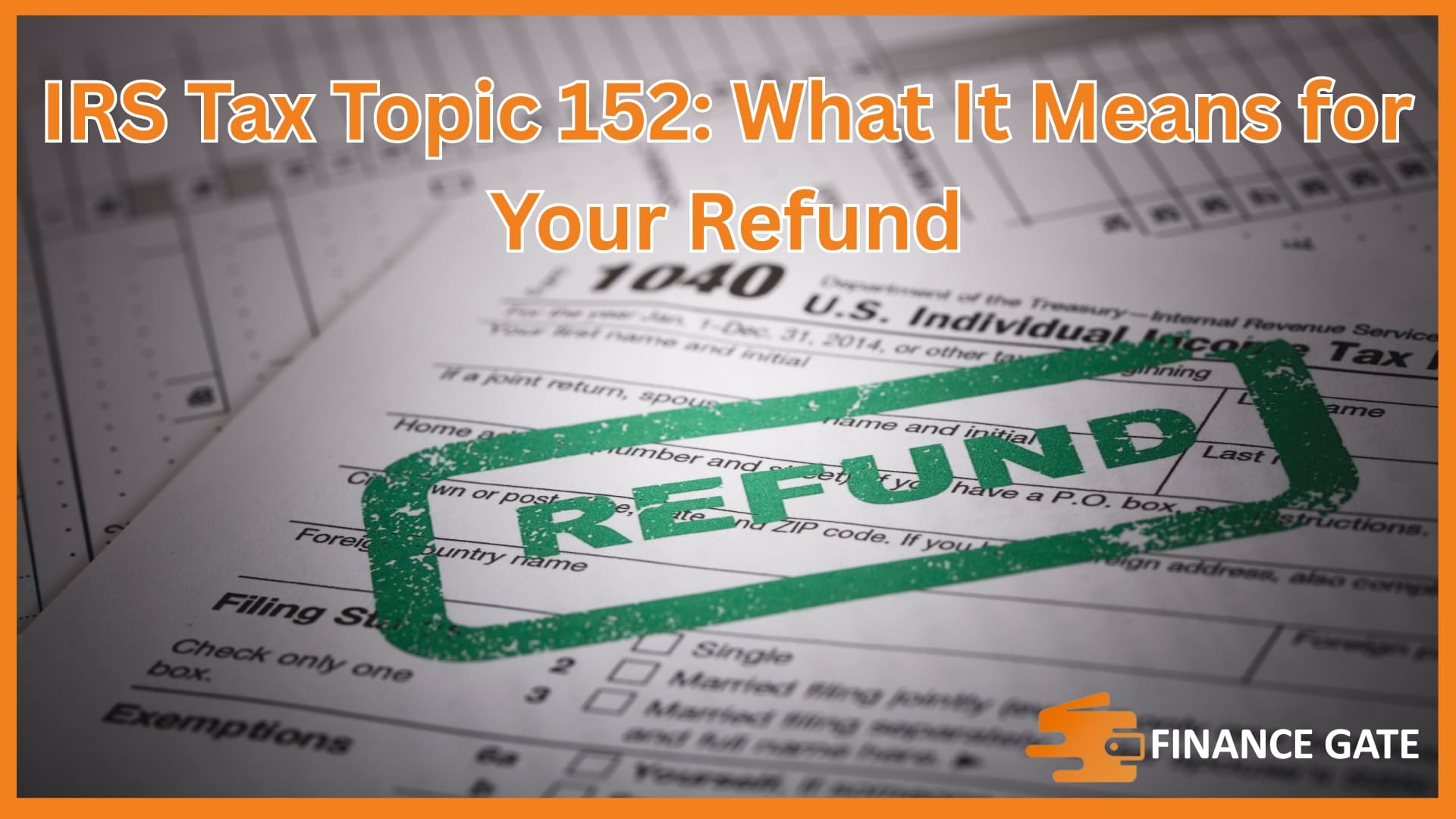Have you ever checked the IRS tool and seen Tax Topic 152? That often triggers anxiety when your refund status shows a processing flag. Research shows this generic reference means the IRS is still processing your tax return, especially if you’re claiming refundable credits or filing amended forms. Many taxpayers see this during tax season when claiming the earned income tax credit or additional child tax credit, which legally delays refunds until mid‑February.
The solution lies in following accurate tax preparation, choosing direct deposit, and using the IRS website tool to track your refund regularly. The complete guide in this article explains everything.
What Is Tax Topic 152?
Tax Topic 152 is a reference code that frequently appears on the IRS website’s “Where’s My Refund?” tool. It indicates that the IRS is processing your tax return and refund, but it does not mean there is a problem with your return. This topic is commonly linked to refunds involving the earned income tax credit or additional child tax credit, which may take longer.
The status of your refund may show Topic 152 when the IRS reviews your information for accuracy. While it signals routine processing, you should monitor your refund status regularly for updates or further notices.
Why May It Take Longer To Process My Tax Return?
Your tax return may take longer to process because the IRS verifies key details, such as personal identification information or eligibility for tax credits. Specifically, returns claiming the earned income tax credit or additional child tax credit often face brief delays. Additionally, errors in the information entered or missing tax forms can trigger an extended review.
Refunds from an amended return may also require more time. Furthermore, if the IRS suspects inconsistencies or flags the return for a tax audit, processing may stall. Topic 152 is a reference that usually means the IRS is still processing your refund.
How Can I Prevent Delays?
To avoid refund delays and reduce the chances of seeing Tax Topic 152 during the tax season, follow these essential tax tips:
- Submit an accurate tax return with correct figures and valid tax forms.
- Double-check your personal identification information before filing your return.
- File your tax return electronically and opt for a refund by direct deposit.
- Avoid errors in the information entered, especially for tax credits and filing status.
- Use the official tool on the IRS website to track your refund status easily.
- Contact a tax professional if unsure about tax preparation or recent tax law changes.
Types Of Refunds
Taxpayers can receive their IRS tax refund through various methods depending on preference, tax filing method, and refund amount.
Direct Deposit:
Many taxpayers choose to receive their refund by direct deposit for faster processing and enhanced security. The IRS processes most refunds within 21 days, especially when filing status and personal identification information are accurate. Choosing to receive your refund through this method significantly shortens the refund process. It allows the IRS to send your tax refund directly to a bank account, eliminating postal delays. Additionally, this option helps avoid common issues that may otherwise take longer to resolve. To track your refund status, use the tool on the IRS website, and see Tax Topic 152 for related refund information.
Paper Check:
If you opt to receive your tax refund as a paper check, expect a longer refund process. The IRS mails checks only after verifying the accuracy of your tax return. Tax Topic 152 may appear on the Where’s My Refund tool if your refund is being processed. Use the tool on the IRS website to track your refund and check your refund status. Any errors in the information entered can delay mailing. To avoid such issues, review your filing status, personal details, and refund amount. You may also consider switching to a refund by direct deposit next year.
Prepaid Debit Card:
Choosing to receive your refund on a prepaid debit card offers flexibility for those without a traditional bank account. The IRS processes your tax return, then loads your refund amount directly onto the card provided. You can use the card to get your refund, pay bills, or withdraw cash from ATMs securely and quickly. Unlike direct deposit, prepaid cards don’t require linking to a bank, which helps those with limited banking access. However, always check card fees and policies beforehand. This method is especially useful during tax season when processing volume can take longer. Cards are reloadable for future use, making them a practical option for refund disbursement.
Mobile Payment Apps:
You may also receive your tax refund through mobile payment apps that support direct deposit functionality. Apps like Cash App, Venmo, or PayPal allow you to provide a routing and account number to the IRS. Once the IRS refund status is approved, your refund information gets sent directly to the app wallet. This option is ideal if you frequently use mobile platforms to manage your finances. It offers quick access to the refund amount, especially if you’re unable to visit a bank or use checks. However, you should verify your personal identification information before submission to avoid errors in the information entered. Tax credits, including the earned income tax credit or the additional child tax credit, are eligible for mobile deposits. Always monitor the app notifications for updates on your refund status after tax return processing completes.
Traditional, Roth, or SEP-IRA:
Taxpayers may allocate all or part of their tax refund to a Traditional, Roth, or SEP-IRA. This option benefits long-term savers while supporting tax preparation strategies. Tax credits, like the earned income tax credit, can increase the amount of your refund, enabling greater retirement contributions. While Tax Topic 152 may indicate the IRS is still processing, it does not impact your IRA designation. Use a qualified tax professional for tax advice and ensure all information you provide is accurate. Contributions to these accounts may also lower state tax liability, depending on your tax filing status and income.
A Health Savings Account (HSA):
Contributing your tax refund to a Health Savings Account (HSA) supports qualified medical expenses while offering potential tax return deductions. This strategy suits individuals with high-deductible health plans and is effective during any tax season. If you choose this option, ensure your tax form reflects it. Tax Topic 152 merely indicates that the IRS is reviewing your return, not that you cannot use this account. Use the IRS website to check your refund status or see topic 152 if delays occur. A well-prepared tax return may help speed up the refund process, especially when supported by a tax professional.
TreasuryDirect:
Another option is using TreasuryDirect to invest your tax refund in U.S. savings bonds. When you file your tax return, simply select this method on your tax form. The IRS allows individuals to purchase Series I bonds directly using part or all of their refund amount. This route offers long-term growth and a secure way to use your refund wisely. Tax Topic 152 does not affect your ability to choose this method. Additionally, if your refund is being processed, you’ll still receive any remaining balance by direct deposit or paper check, depending on your preferences.
Conclusion
Tax Topic 152 simply signals that the IRS processes your tax return more slowly because of processing delays or credit verification. It does not mean a problem with your tax refund amount or trigger a tax audit, unless further action is required. If your refund is being processed beyond the typical 21‑day window, continue to monitor your refund status using IRS tools and respond promptly if contacted. This guide gave practical advice for a quick refund process and accurate tax return filing. Do you have any specific tax questions about Topic 152? For details on state-level refunds, including New York State, you can check your refund status here.
FAQs
1. What should I do if I haven’t received your refund after 21 days?
You should check your refund status on the IRS website or contact the IRS directly.
2. Does Tax Topic 152 mean I will get a refund?
No, it only means your tax return is being processed, and refund eligibility is still under review.
3. Can my filing status affect how long my refund takes?
Yes, filing status and claiming tax credits like EITC or ACTC may delay your refund.
4. What is the fastest way to get my tax refund?
Use e-file and choose direct deposit to receive your refund as quickly as possible.
5. Is Tax Topic 152 always shown before a refund is approved?
Not always; it’s a generic message used during the refund process for most taxpayers.







